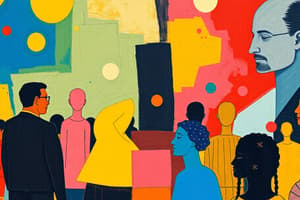Podcast
Questions and Answers
Which of the following characteristics is NOT considered a key trait of modern society?
Which of the following characteristics is NOT considered a key trait of modern society?
- Agrarian lifestyles (correct)
- Urbanization
- Secularization
- Industrialization
What does Durkheim emphasize as essential for social cohesion?
What does Durkheim emphasize as essential for social cohesion?
- Collective conscience (correct)
- Rationalization
- Individualism
- Economic factors
According to Marx, what is the primary driver of societal change?
According to Marx, what is the primary driver of societal change?
- Cultural evolution
- Class conflict (correct)
- Socialization processes
- Technological advancements
Which of the following concepts describes the organized pattern of social relationships in society?
Which of the following concepts describes the organized pattern of social relationships in society?
Functionalism views society as:
Functionalism views society as:
How does social science knowledge primarily differ from everyday knowledge?
How does social science knowledge primarily differ from everyday knowledge?
Which theorist is associated with the concept of rationalization through bureaucracy?
Which theorist is associated with the concept of rationalization through bureaucracy?
The concept of 'agency' refers to:
The concept of 'agency' refers to:
What is one of the primary sources of everyday knowledge about society?
What is one of the primary sources of everyday knowledge about society?
What role does social order play in society?
What role does social order play in society?
What distinguishes qualitative methods from quantitative methods in social science research?
What distinguishes qualitative methods from quantitative methods in social science research?
Which of the following accurately describes culture as an inheritance?
Which of the following accurately describes culture as an inheritance?
How do working-class parents typically differ from middle-class parents in child-rearing practices?
How do working-class parents typically differ from middle-class parents in child-rearing practices?
What is the primary purpose of socialization in society?
What is the primary purpose of socialization in society?
In what way does Mead's theory describe socialization?
In what way does Mead's theory describe socialization?
What is the key difference between formal and informal deviance?
What is the key difference between formal and informal deviance?
Which statement accurately reflects the limitations of using surveys in research?
Which statement accurately reflects the limitations of using surveys in research?
What is an implication of the idea that deviance is a social construction?
What is an implication of the idea that deviance is a social construction?
Which of the following is a strength of participant observation as a research method?
Which of the following is a strength of participant observation as a research method?
What do research ethics aim to achieve in social science studies?
What do research ethics aim to achieve in social science studies?
Flashcards are hidden until you start studying
Study Notes
Modern Society Characteristics
- Modern society is marked by industrialization, urbanization, secularization, increased use of technology, individualism, and rationalization.
- Social mobility and global interconnectedness are important aspects.
Theories of Social Change
- Marx: Economic factors and class conflict drive societal change.
- Weber: Rationalization, especially through bureaucracy and religious influences (e.g., Protestant work ethic), shapes societal change.
- Durkheim: Social cohesion and collective conscience are fundamental, with societal change stemming from shifts in how societies maintain solidarity.
Functionalism and Conflict Theory
- Functionalism: Views society as a complex system where parts work together for stability and social order. Each part serves a function contributing to the whole.
- Conflict theory: Focuses on power struggles between social classes or groups, seeing societal structures as outcomes of conflict and inequality.
Sociological Concepts
- Sociological imagination: The ability to connect individual experiences with broader societal influences.
- Social structure: The organized pattern of social relationships and institutions forming society.
- Social construction: The idea that social realities (like gender roles or race) are created and maintained through social processes and interactions.
- Social order: The arrangement of practices and behaviors that society members rely on for daily life, keeping society functioning.
- Socialization: The process of learning and internalizing societal values, norms, and practices.
- Agency: Individuals' capacity to act independently and make choices.
Social Science Knowledge vs. Everyday Knowledge
- Social science knowledge is systematic, empirical, and based on research and data analysis.
- Everyday knowledge is often anecdotal, personal, or based on untested assumptions.
Sources of Everyday Knowledge
- Personal experiences, cultural norms, traditions, media, and family all contribute.
Scientific Nature of Social Science Research
- It employs systematic methodologies, rigorous data collection, and analysis, aiming for replicable and generalizable results.
Quantitative vs. Qualitative Methods
- Quantitative methods: Focus on numerical data, using statistics to find patterns and correlations.
- Qualitative methods: Focus on understanding behaviors and experiences through interviews, observations, and content analysis.
Research Methods: Strengths and Limitations
- Survey:
- Strength: Quickly gathers data from large populations.
- Limitation: May not capture the depth of individual experiences.
- In-depth Interviews:
- Strength: Provides deep, detailed insights.
- Limitation: Time-consuming and not easily generalizable.
- Non-participant Observation:
- Strength: Observes behaviors without influencing them.
- Limitation: Limited understanding of participants' internal states.
- Participant Observation:
- Strength: Immerses the researcher in the environment for deeper understanding.
- Limitation: Risk of researcher bias.
- Ethnography:
- Strength: Provides a holistic view of a culture or community.
- Limitation: Time-intensive and may be difficult to generalize.
Research Ethics
- Research ethics are guidelines to ensure research integrity and participant protection.
- They are essential to maintain trust, avoid harm, and ensure responsible research practices.
Culture Defined
- Culture represents the shared values, norms, symbols, languages, and artifacts that society members use to interpret and respond to the world.
Components of Culture
- Symbols: Flags, religious icons.
- Language: English, Spanish, sign language.
- Values: Freedom, equality.
- Norms: Shaking hands, table manners.
- Artifacts: Clothing, technology.
Role of Culture in Society
- Culture helps individuals understand the world, guides behavior, and creates belonging and identity.
Culture as Inheritance vs. Social Construction
- Inheritance: Passed down through generations, often perceived as static.
- Social Construction: Continuously shaped by social interactions and experiences.
Sociological vs. Biological Explanations of Behavior
- Sociological: Focus on the influence of social environments and cultural practices.
- Biological: Attribute behavior to genetics and biology.
Culture as Freedom vs. Constraint
- Freedom: Allows individuals to express themselves and create new meanings.
- Constraint: Imposes rules and norms that limit behavior and thinking.
Socialization
- Socialization is the process of learning and internalizing societal norms, values, and behaviors.
Purpose of Socialization
- Prepares individuals for social participation and maintains the continuity of culture and society.
Agents of Socialization
- Family, peers, education, media, and religious institutions.
Personal vs. Social Identity
- Personal Identity: Unique personal characteristics and traits.
- Social Identity: How individuals are perceived and categorized based on social roles and group memberships (e.g., gender, race).
Sanctions
- Rewards or punishments that encourage conformity to social norms.
Mead's Theory of Role-Taking
- Socialization involves imagining oneself in others' roles, learning social norms by understanding how others might perceive and react to actions.
Working-Class vs. Middle-Class Parenting
- Working-Class: Emphasize accomplishment of natural growth, focusing on children's independence and unstructured time.
- Middle-Class: Practice concerted cultivation, actively structuring children's time and fostering skills and talents.
Gender Norms for Males
- Males are often expected to be tough, emotionally reserved, and dominant.
Sources and Enforcement of Gender Norms
- They are reinforced by family, media, and peers through socialization and societal pressure.
Consequences of Gender Norms on Males
- They can lead to emotional repression, aggression, and mental health struggles.
Social Control
- Refers to the mechanisms society uses to regulate individuals' behavior to maintain social order.
Deviance
- Behavior that violates social norms or expectations.
Informal vs. Formal Deviance
- Informal Deviance: Minor norm violations (e.g., wearing inappropriate clothes).
- Formal Deviance: Breaking laws or officially sanctioned rules (e.g., theft).
Deviance as a Social Construction
- Deviance is defined by societal norms, and what is considered deviant can change depending on the context and culture.
Arguments for and Against Deviance
- In Favor: Deviance can challenge norms and bring about social change.
- Against: It can disrupt social order and lead to harm.
Theories of Deviance
- Durkheim's Functionalism: Deviance clarifies norms and promotes social cohesion.
- Merton's Strain Theory: Deviance arises when individuals can't achieve societal goals through legitimate means.
- Conflict Theory: Deviance results from social inequality, where the powerful define what is deviant.
- Labeling Theory: Deviance occurs when society labels individuals as deviant, affecting their self-identity.
- Control Theory: Deviance happens when an individual's bonds to society are weak.
Studying That Suits You
Use AI to generate personalized quizzes and flashcards to suit your learning preferences.




